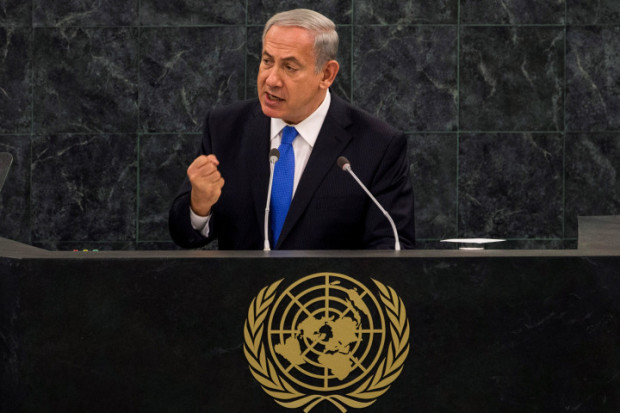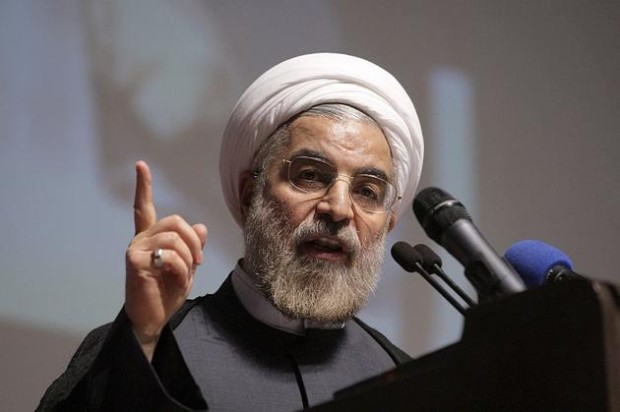redo Jump to...
print Print...
Israeli Prime Minister Benjamin Netanyahu served notice at the United Nations Tuesday that if US-led negotiations don’t stop Iran’s drive to a nuclear arsenal, his country would – by itself.

Israeli Prime Minister Benjamin Netanyahu addresses U.N.
“I want there to be no confusion on this point. Israel will not allow Iran to get nuclear weapons,” the Israeli prime minister said during a half-hour address to the UN General Assembly. “If Israel is forced to stand alone, Israel will stand alone.”…
Netanyahu blasted the charm offensive of Iran’s new president, Hassan Rouhani, whom he described as a “loyal servant of the regime,” just like his predecessor, Mahmoud Ahmadinejad.
“Ahmadinejad was a wolf in wolf’s clothing. Rouhani is a wolf in sheep’s clothing, a wolf who thinks he can pull the wool over the eyes of the international community,” Netanyahu declared.
“He fooled the world once. Now he thinks he can fool it again. You see, Rouhani thinks he can have his yellowcake and eat it too,” Netanyahu said, referring to a form of uranium concentrate used in nuclear-weapons development. “Iran’s vast, feverish nuclear [drive has] continued unabated” since Rouhani’s election.
Israel believes Iran already has enough enriched uranium for an atomic bomb, if it is processed further into weapons-grade fuel. Mr. Netanyahu said Tehran is also building long-range missiles to deliver nuclear weapons, a conclusion the U.S. government shares.
Iran immediately denounced Netanyahu for “saber rattling” and “inflammatory” talk. Iran’s diplomatic mission at the U.N. responded to Mr. Netanyahu’s speech by warning Israel that Tehran would retaliate against any military strike. “The Israeli prime minister had better not even think about attacking Iran, let alone planning for that,” Iran’s government said.
Netanyahu devoted most of his annual UN address to Iran. “A nuclear-armed Iran in the Middle East wouldn’t be another North Korea – it would be another 50 North Koreas,” he said. “In the last three years, Iran has ordered, planned or perpetrated terrorist attacks in 25 countries on five continents.”

Iranian cleric and president Hassan Rouhani
Mr. Rouhani last week cast himself as a more accommodating and diplomatically adroit successor to Mahmoud Ahmadinejad, whose acerbic rhetoric over the past eight years pit Iran against Israel and much of the Western world. The maneuvering was welcomed by the Obama administration, which has spent recent years ramping up economic sanctions to pressure Tehran into cooperating with international nuclear inspectors.
But Mr. Netanyahu was not sold. After a visit Monday to the White House, where he cautioned Mr. Obama not to take the Iranians at their word, the Israeli prime minister headed to New York [to speak at the UN], where he stressed that “Israel will never acquiesce to nuclear arms in the hands of a rogue regime that repeatedly promises to wipe us off the map,” alluding to a phrase Mr. Ahmadinejad had used.
“When it comes to Iran’s nuclear weapons program, here’s my advice: Distrust, dismantle and verify,” said Mr. Netanyahu, who added that while “we all want to give diplomacy with Iran a chance to succeed,” the economic pressure and the threat of military force must be kept against Iran if the process is going to succeed.
“Last Friday, Rouhani assured us that, in pursuit of its nuclear program, Iran – this is a quote – Iran has never chosen deceit and secrecy,” the Israeli prime minister said. “Well, in 2002, Iran was caught red-handed secretly building an underground centrifuge facility in Natanz. And then in 2009, Iran was again caught red-handed secretly building a huge underground nuclear facility for uranium enrichment in a mountain near Qom.”
Mr. Netanyahu said other Iranian actions were incompatible with Mr. Rouhani’s words.
“Why would a country that claims to only want peaceful nuclear energy, why would such a country build hidden underground enrichment facilities?” Mr. Netanyahu asked. “Why would a country with vast natural energy reserves invest billions in developing nuclear energy? Why would a country intent on merely civilian nuclear programs continue to defy multiple Security Council resolutions and incur the tremendous cost of crippling sanctions on its economy?”
The Israeli prime minster added that Mr. Rouhani served as Iran’s chief nuclear negotiator from 2003 to 2005, during which time “he masterminded the strategy which enabled Iran to advance its nuclear weapons program behind a smoke screen of diplomatic engagement and very soothing rhetoric.”
Israel’s leader said the U.S. and U.N., rather than considering ways to relieve financial pressure on Iran, should be preparing to impose more onerous penalties in coming months.
“Here is what the international community must do: First, keep up the sanctions,” Mr. Netanyahu said. “If Iran advances its nuclear-weapons program during negotiations, strengthen the sanctions.”
Netanyahu hinted that military strikes can be averted only if Tehran is willing to follow four key steps: “First, cease all uranium enrichment. This is called for by several Security Council resolutions. Second, remove from Iran’s territory the stockpiles of enriched uranium. Third, dismantle the infrastructure for nuclear breakout capability, including the underground facility at Qom and the advanced centrifuges in Natanz,” he said. “And, four, stop all work at the heavy water reactor … aimed at the production of plutonium.”
The article above is excerpted and adapted from articles which were published in The New York Post, Wall Street Journal and Washington Times.
Questions
1. Name the leaders of Israel and Iran.
2. List all of the direct quotes from Mr. Netanyahu’s speech at the U.N. General Assembly
a) about Iran’s nuclear program
b) about Israel’s response to Iran’s nuclear program
c) about Iran’s new president’s friendly demeanor
3. What do Israel and the U.S. believe to be true about Iran’s nuclear program?
4. What image is the new president of Iran attempting to portray?
5. a) What is the bottom line for Israel – what do they want Iran to do?
b) Why?
6. Consider Iran’s history and rhetoric on Israel. How would you describe Israel’s demands: unreasonable, pragmatic, arrogant, etc. Explain your answer.
Background
IRAN’S NUCLEAR PROGRAM:
- Iran’s 20 year secret nuclear program was discovered in 2002. Iran says its program is for fuel purposes only, but it has been working on uranium enrichment which is used to make nuclear bombs. [NOTE ON URANIUM ENRICHMENT: Enriched uranium is a critical component for both civil nuclear power generation and military nuclear weapons. The International Atomic Energy Agency attempts to monitor and control enriched uranium supplies and processes in its efforts to ensure nuclear power generation safety and curb nuclear weapons proliferation (buildup).]
- Under the United Nations’ NPT (Non Proliferation Treaty) countries are not allowed to make nuclear weapons (except for the 5 that had nuclear weapons prior to the treaty – the U.S., Russia, China, France, the United Kingdom).
- Safeguards are used to verify compliance with the Treaty through inspections conducted by the UN’s nuclear watchdog, the IAEA (International Atomic Energy Agency).
- The IAEA issued a report on Sept. 15, 2008 that said Iran has repeatedly blocked an investigation into its nuclear program and the probe is now deadlocked.
- The U.N. Security Council has already imposed four sets of sanctions on Iran over its nuclear defiance. Despite the sanctions, Iran has refused to end its nuclear program.
- A group of U.S. and Russian scientists said in a report issued in May 2009 that Iran could produce a simple nuclear device in one to three years and a nuclear warhead in another five years after that. The study, published by the nonpartisan EastWest Institute, also said Iran is making advances in rocket technology and could develop a ballistic missile capable of firing a 2,200-pound nuclear warhead up to 1,200 miles “in perhaps six to eight years.”
- The Iranian government has called for the destruction of Israel on numerous occasions. It is believed that once obtained, Iranian President Ahmadinejad would use nuclear weapons against Israel.
Daily “Answers” emails are provided for Daily News Articles, Tuesday’s World Events and Friday’s News Quiz.




